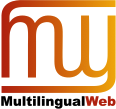Monthly Archives: August 2014
Posts
Updated article: Declaring language in HTML
The article Declaring language in HTML was changed at the end of May. A noticeable change was the introduction of additional headings, to enable readers to more quickly spot relevant information. Also a new section was added: What if element content and attribute values are in different languages?
German, Spanish, Russian and Ukranian translators are asked to update their translations.
Predefined Counter Styles Draft Published
The W3C i18n Working Group has published a new Working Draft of Predefined Counter Styles. This document describes numbering systems used by various cultures around the world and can be used as a reference for those wishing to create user-defined counter styles for CSS. The latest draft synchronizes the document with changes to the related document CSS Counter Styles Level 3, for which a second Last Call is about to be announced. If you have comments on the draft, please send to www-international@w3.org.
Industry speakers lined up to discuss use cases and requirements for linked data and content analytics

The agenda of the 4th LIDER roadmapping workshop and LD4LT event has been published. A great variety of industry stakeholders will talk about linked data and content analytics. Industry areas represented include content analytics technology, multilingual conversational applications, localisation and more.
The workshop will take place on September 2nd in Leipzig, Germany and it will be collocated with the SEMANTiCS conference. The workshop will be organised as part of MLODE 2014 and will be preceded by a hackathon on the 1st of September.
The event is supported by the LIDER EU project, the MultilingualWeb community, the NLP2RDF project as well as the DBpedia project.
XLIFF 2.0 becomes OASIS standard
The XML Localization Interchange File Format (XLIFF) version 2.0 has been approved as an OASIS Standard.
XLIFF is the open standard bi-text format: Bi-text keeps source language and target language data in sync during localization.
The publication of XLIFF 2.0 is of high importance for W3C since several of the main ITS 2.0 data categories can be used within XLIFF 2.0 to provide content related information during the localization process. Full ITS 2.0 support is planned for the upcoming XLIFF 2.1 version.
Report available for W3C MultilingualWeb workshop in Madrid

A report summarizing the MultilingualWeb workshop in Madrid is now available from the MultilingualWeb site. It contains a summary of each session with links to presentation slides and minutes taken during the workshop in Madrid. The workshop was a huge success, with approximately 110 participants, and with the associated LIDER roadmapping workshop. The Workshop was hosted by Universidad Politécnica de Madrid, sponsored by the EU-funded LIDER project, by Verisign and by Lionbridge.
A new workshop in the MultilingualWeb series is planned for 2015.
W3C® liability, trademark and permissive license rules apply.
Questions or comments? ishida@w3.org